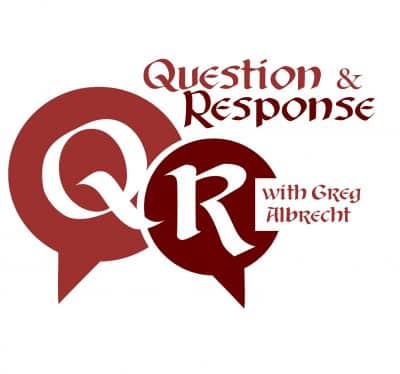Q&R: Bumping into unChristlike faith statements – Brad Jersak

Question
I am just reading your book, ‘A More Christlike God’. I have been deconstructing and reconstructing my faith for the past 10-15 years. It’s definitely a work in progress. I am so grateful to people like you who are helping others along. I could, would, never go back.
In our church statement of faith, there is a section that reads:
- We believe in the resurrection of both the saved and the unjust. Those saved through faith in Jesus are fully restored to God into a resurrection of eternal life while the unjust are separated from God’s presence into a resurrection of judgment. [John 5:28-29; Matthew 25:31-46]
This does not sound right to me . I thought we could never be separated from God. Do you have a way for me to address this?
Response
Faith statements are normally meant to summarize and describe what a faith community or ministry believes is essential to their beliefs. Unfortunately, sometimes they actually shroud the gospel itself, much like the scaffolding blanketing the building in the photo above. Sometimes a faith statement tries to be so specific and selective that it becomes polemical and even unChristlike in the stand it takes against other brothers and sisters.
When I read faith statements, I ask myself, where did this statement of faith come from? Why was it written? Who wrote it? Why did it depart from the ancient creeds? On whose authority? Does the community that confesses it recognize where they may have changed the historic faith of the apostles and supplemented it. Are they aware that it contains sectarian elements that are debatable and which the first Christians advisedly omitted or avoided? In this example, why did they cite John 5 and Matt. 25 as “separation from God” texts, but failed to note any of the dozens of inclusivist passages in the New Testament?
In my impatience, I might roll my eyes and say “Yup, typical.” But then I would also ask, “Is anyone making me affirm this? Is anyone required to embrace it in practice? Or can I just leave it there and move on without having to throw in my two cents?”
Analogy: I will risk sharing a contentious analogy and leave the source anonymous. First, consider the ancient faith described in the Bible (e.g., the first paragraph of 1 Corinthians 15) or in the Apostles’ Creed. Then ponder how relatively recent and immature (historically speaking) that modern statements of faith can be, and how often they fluctuate through repeated revision.
I might liken the comparison to a parent who is invited to a child’s tea party. The child pours a tiny cup of imaginary tea for Mommy or Daddy and offers it to them in all sincerity. Does the parent drink the imaginary tea or do they need to correct the child? Can they take a sip and smile and continue to love them? Or do we have to make an issue of it, providing them with a history of tea and the correct recipes for making actual tea? Now, this analogy can sound very condescending, if we assume that WE are the parent. But can see how the New Testament describes Christ, the prophets, and the apostles as the adults in the room and that the rest of us are spiritual children by comparison? What if “getting it right” has more to do with playing well together than policing one another’s parties.
In other words, do we have grace to see the intent of faithfulness and affirm that intent, even if we don’t agree on every point?
On the other hand, what if the tea being served is toxic? What if it’s poison to the soul? Does this require addressing for the good of the ministers or congregation? And if so, what is the wisest and most winsome way to address it? Or does the fundamentalist conviction of separation from God–which reads a few individual texts, literalizes them, and totalizes them–so permeate the mindset of your faith community that it is a battle best left until you can fight it without it just being a suicide run?
I think if it were me, I would put “Love one another” at the top of your agenda and see how to continue demonstrating rather than arguing ‘no separation.’ And rather than directly assaulting the statement itself, I might steer people by your example and in private conversations toward a Christlike view of God that eventually leads them to self-discovery, where one day they look at the statement and say, “Wow, I haven’t believed that for a while.”
It’s tricky because love is our highest dogma and yet we want to see that separation theology cleansed from our various traditions. Praying mercy for you!










 Plain Truth Ministries | Box 300 | Pasadena, CA 91129-0300
Plain Truth Ministries | Box 300 | Pasadena, CA 91129-0300

